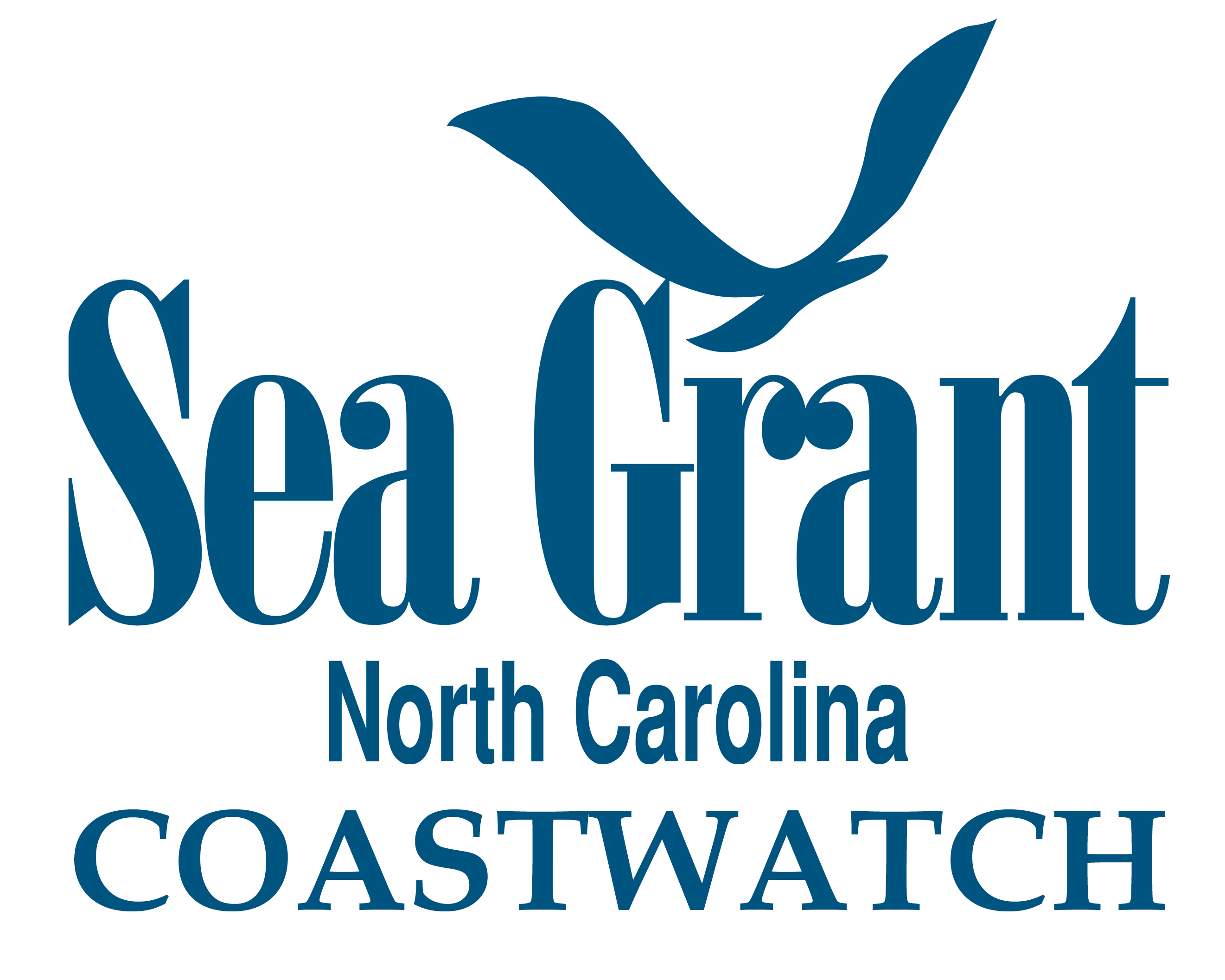By REBECCA NAGY
Rebecca Nagy is a communications intern with North Carolina Sea Grant. She recently graduated from North Carolina State University with a degree in English and a minor in environmental science.
Every other year, the National Oceanic and Atmospheric Administration presents the Walter B. Jones Sr. Awards for Coastal and Ocean Resource Management. This year, six recipients of this prestigious honor are from North Carolina — all with North Carolina Sea Grant ties.
The awards are named for the late Walter B. Jones Sr., who represented North Carolina in the U.S. House of Representatives from 1966 to 1992. He supported many initiatives, including NOAA’s fishery and coastal management programs, commercial shipping, oil-spill cleanups and prevention, and flood-insurance reform.
Spencer Rogers, Sea Grant coastal construction and erosion specialist, received the honor of Coastal Steward of the Year. This award is given to individuals who display continued leadership in seeking the balance between human use of the coast and ocean and the needs of the environment.
Among the six recipients of the Excellence in Coastal and Marine Graduate Study award, four are from North Carolina. This distinction honors graduate students whose academic study seeks to contribute to the development of new or improved techniques of coastal and ocean management.
“The high number of North Carolina graduate students among the winners speaks to the excellent quality of marine and coastal research being conducted in our state, as well as to the caliber of the students themselves,” says Chris Brown, vice president for research and graduate education for the University of North Carolina System.
“Spencer’s Coastal Steward award notes the strength of the North Carolina Sea Grant outreach program that links university expertise with community needs,” Brown adds.
Currituck County received an award for Excellence in Local Government. The accolade recognizes local governments that have influenced change in coastal management through increasing commitment to public awareness of coastal issues and advancing the goals of the Coastal Zone Management Act, or CZMA.
STEWARD OF THE COAST
• Spencer Rogers is one of two individuals named Coastal Steward of the Year.
“This honor reflects Spencer’s three decades of service to coastal communities and the state overall through his North Carolina Sea Grant extension work in coastal construction, erosion and other factors related to coastal processes,” notes Susan White, Sea Grant executive director.
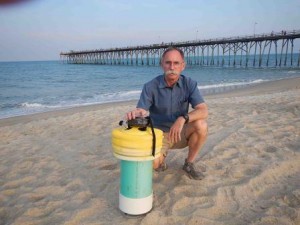
Spencer Rogers deployed data-logging drifters on North Carolina beaches to provide information about rip current circulation. Photo by Bob Humphrey.
Since joining Sea Grant in 1978, Rogers has worked diligently to help private property owners, builders, designers and government agencies to develop and implement hurricane-resistant construction methods, understand shoreline-erosion alternatives and implement marine-construction techniques.
Rip current research led by Rogers — along with a graduate student from the University of North Carolina Wilmington and a partnership including the National Weather Service Wilmington office and Carolina Beach Ocean Rescue — has earned national media attention from the Associated Press to Good Morning America.
He is based at UNCW’s Center for Marine Science, where he serves on faculty. He also is adjunct faculty for civil, construction and environmental engineering at North Carolina State University. Rogers is the co-vice chairman of the N.C. Coastal Resource Advisory Council and a member of the N.C. Science Panel on Coastal Hazards. Rogers is honored to receive this award but still sees much work on the horizon.
“My short-term plans include continued work on rip current science and warning messaging, hurricane building damage analysis and mitigation techniques, shoreline-erosion prediction, and continuing assistance to the N.C. Coastal Resources Commission,” Rogers says.
GRADUATE IMPACT
The Excellence in Coastal and Marine Graduate Study award recognizes graduate students whose academic study promises to contribute to coastal or ocean management. Nominees are judged on their contributions to advancing the goals of the CZMA, their use of innovative approaches, the technical soundness of their research, and the transferability of the results to ocean management practices.
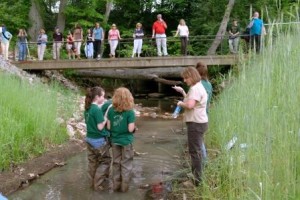
Barbara Doll speaks to volunteers at a Girls In Science Earth Day program at Rocky Branch. NC Sea Grant file photo.
• Barbara Doll, Sea Grant’s water protection and restoration specialist, earned a doctoral degree from NC State University in 2013. Doll’s studies included developing and evaluating field assessment techniques used in stream restoration. Her outreach efforts on water quality and stream and estuarine restoration are making a positive impact on North Carolina’s coastal habitats.
While she worked to complete her graduate degree, Doll led research and outreach programs — in partnership with engineers, landscape architects and other groups — in coastal water quality, and land use and development. Doll also teaches graduate and undergraduate classes at NC State, where she is on faculty.
“Barbara’s innovative and rigorous academic research and her ability to transfer research-based solutions to improving coastal streams and ecosystems make her well deserving of this award,” notes Jack Thigpen, Sea Grant extension director.
For Doll, the most rewarding part of the graduate process came when she began to put together data from the 156 streams that were surveyed.
“I was excited to produce information about stream restoration that was insightful and perhaps even valuable to restoration program managers and designers to help them improve the practice of restoration,” Doll says.
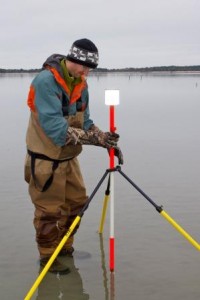
Justin Ridge operates a laser scanner to map and study oyster reefs. Photo by Emily Woodward.
• Justin Ridge is a doctoral candidate at the University of North Carolina at Chapel Hill’s Institute of Marine Sciences. Ridge received the 2014 North Carolina Sea Grant/North Carolina Coastal Reserve joint fellowship. His work is assisting Marine Corps Base Camp Lejune in efforts to sustainably use the coastal zone for training exercises.
“I have watched Justin grow into one of the leading graduate students at IMS, and a perfect candidate for the Walter B. Jones award. Justin is conducting cutting-edge research that sits right at the meeting point between human utilization of the coastal zone and expected ecological impacts associated with climate change,” says John Fear, deputy director of Sea Grant.
Ridge also uses laser scanners to create three-dimensional maps of entire oyster reefs to determine where they grow best. This allows reefs to be built in locations that will maximize the oysters’ chance of success. In addition, Ridge is the cofounder of SciREN, the Scientific Research and Education Network, which connects researchers to teachers. Scientists provide lesson plans that meet curriculum requirements using content that is based on their research.
“The most rewarding part of my research was the opportunity to mentor an undergraduate student, and watch as her own interest in my research inspired her to develop new and complementary questions,” Ridge says.
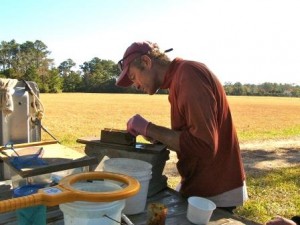
Paul Rudershausen’s research often requires that he carry his equipment into the field. Photo by Sharon Settlage.
• Paul Rudershausen is a doctoral candidate at NC State studying fisheries, wildlife and conservation biology under the guidance of Jeffrey Buckel and Joseph Hightower. His project focuses on estimating the demographics of mummichogs — a fish native to Atlantic coastal salt marshes — and comparing that information to the quality of habitats where these fish are found.
“The most rewarding part of my research has been to work on an issue of local importance that is easily overlooked,” Rudershausen says.
Rudershausen’s work has been published in Marine Ecology Progress Series, an international journal. He also serves as a scientific advisor to the N.C. Marine Fisheries Commission’s strategic habitat area committee.
“Paul’s work ethic is in the top one percent of our peers. There are few, if any, who could have accomplished the amount and quality of work that Paul has in the last three years,” Buckel notes.
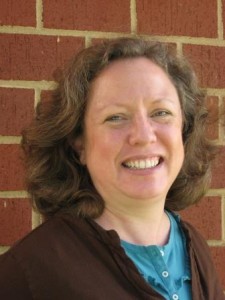
Sharon Settlage also has been recognized for her “Coastwatch” work by the N.C. Association of Government Information Officers. Photo by E-Ching Lee.
• Sharon Settlage was a graduate intern in science communications at Sea Grant while she completed her master’s degree in technical communication at NC State. She wrote for Coastwatch magazine on topics including fisheries, ecosystems, plant biology, geology and community planning. Her work earned her honors from the N.C. Association of Government Information Officers.
“Sharon’s collaborative personality and ability to understand the coastal zone will guide her in varied future endeavors, including science communications and community service,” notes Katie Mosher, Sea Grant communications director.
During her time at Sea Grant, Settlage partnered with the N.C. Division of Marine Fisheries to develop brochures for consumers and restaurants that explain oyster shell recycling efforts in North Carolina. Settlage also has a doctoral degree in crop science from NC State.
“Working at Sea Grant and writing for Coastwatch taught me so much about the value of our coastal areas and helped me appreciate their beauty and worth,” she says.
COMMUNITY MENTORS
• Currituck County received the award for Excellence in Local Government for its Currituck Goes Green Initiative. This honor is given to communities that have inspired positive change in coastal management by developing or implementing principles embodied by the CZMA.
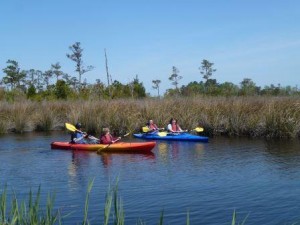
The Currituck Sound Water Quality Fair provided an opportunity for visitors to enjoy the water in kayaks. Photo by Sharon Settlage.
“Currituck County leaders deserve recognition for their foresight in taking steps that will help preserve their valuable natural resources as the county’s population and economy continue to grow,” says Gloria Putnam, Sea Grant’s coastal resources and communities specialist, who is among the initiative partners.
The project, started in 2009, includes partnerships among the N.C. Cooperative Extension, Sea Grant, NC State, East Carolina University, N.C. Coastal Federation, UNC Coastal Studies Institute and other community members.
“With the assistance of partners and community support, the Currituck Goes Green Initiative established a strong foundation for the continued management of important coastal resources. This commitment is reflected in recent county capital projects and local policies that apply to new development,” says Ben Woody, Currituck County planning and community development director.
The initiative has led to water quality fairs, rain garden demonstrations, rain-barrel workshops, and wetland and wildlife gardens.
For this story and for links to past stories in Coastwatch featuring work by the award winners, go to www.nccoastwatch.org.
See the full list of Jones Awards winners at oceanservice.noaa.gov/jone-noaawards- 2014winners.html.
This article was published in the Spring 2015 issue of Coastwatch.
For contact information and reprint requests, visit ncseagrant.ncsu.edu/coastwatch/contact/.
